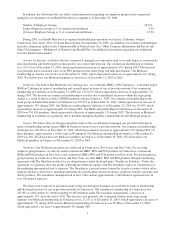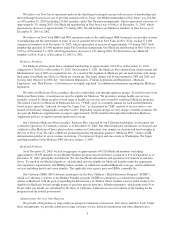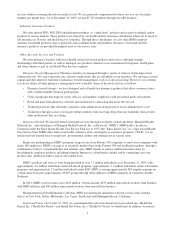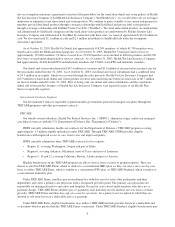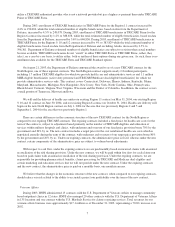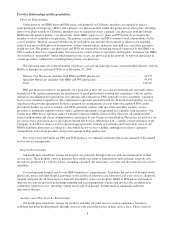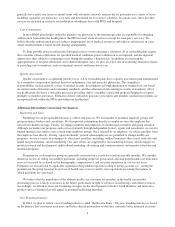Health Net 2003 Annual Report Download - page 15
Download and view the complete annual report
Please find page 15 of the 2003 Health Net annual report below. You can navigate through the pages in the report by either clicking on the pages listed below, or by using the keyword search tool below to find specific information within the annual report.the California Health Insurance Act unless certain tax credit legislation is enacted. To date, no such tax credit has been
proposed or enacted. If an employer elects to pay a fee rather than provide coverage, the fee will be used by the State to
contract with private health carriers to provide health coverage to those who are not covered by their employer.
The California Chamber of Commerce and other business groups have qualified an initiative referendum for the
November 2004 ballot to repeal the California Health Insurance Act. Should the referendum fail, some of these groups
have indicated that they may sue to overturn substantial portions of the Act based on arguments that these provisions
violate Federal law. No assurances can be given as to whether the initiative referendum will successfully overturn the
legislation, or whether subsequent litigation will do so. In the event the California Health Insurance Act survives
challenge, it may provide us and other health plans with potential additional markets, but it is uncertain at this time
whether such additional business, if any, will be forthcoming.
California HMO Regulations. California HMOs, such as HN California and our behavioral health plan, MHN, are
subject to California state regulation, principally by the Department of Managed Health Care (“DMHC”) under the Knox-
Keene Act. Among the areas regulated by the Knox-Keene Act are:
• adequacy of administrative operations,
• the scope of benefits required to be made available to members,
• procedures for review of quality assurance,
• enrollment requirements,
• composition of policy making bodies to assure that plan members have access to representation,
• procedures for resolving grievances,
• the interrelationship between HMOs and their health care providers,
• adequacy and accessibility of the network of health care providers,
• timely and accurate payment of provider claims, and
• initial and continuing financial viability of the HMO and its risk-bearing providers.
Any material modifications to the organization or operations of HN California and MHN are subject to prior review
and approval by the DMHC. This approval process can be lengthy and there is no certainty of approval. Other significant
changes require filing with the DMHC, which may then comment and require changes. In addition, under the Knox-Keene
Act, HN California and MHN must file periodic reports with, and are subject to periodic review and investigation by, the
DMHC. Non-compliance with the Knox-Keene Act may result in an enforcement action, fines and penalties, and, in
egregious cases, limitations on or revocation of the Knox-Keene license.
California Assembly Bill 1455. Assembly Bill 1455 (“AB 1455”) was signed into law on September 28, 2000,
amending and adding several sections to the Knox-Keene Act. AB 1455 increased the interest rate that health care service
plans must pay on uncontested claims not paid promptly within the required time period and granted the DMHC
additional authority to impose monetary penalties and other sanctions on health plans engaging in certain “unfair payment
practices” (as defined in AB 1455). AB 1455 also required the DMHC to adopt regulations regarding provider dispute
resolution by health care service plans. The final regulations, which address both claims reimbursement and provider
dispute resolution procedures, took effect on August 25, 2003 and the DMHC advised health care service plans to
implement them for all services provided on and after January 1, 2004. On November 12, 2003, the California Healthcare
Association (“CHA”) filed a petition for writ of mandate in the Superior Court, County of Sacramento, challenging certain
requirements of the AB 1455 regulations regarding timely filing of claims, reasonable and customary charges and timely
filing of disputes. We are continuing to comply with all aspects of AB 1455 pending final resolution of CHA’s challenge.
Other HMO Laws and Regulations.
In each state in which our HMOs do business, our HMOs must meet numerous state licensing criteria and secure the
approval of state licensing authorities before implementing certain operational changes, including the development of new
product offerings and, in some states, the expansion of service areas. To remain licensed, each HMO must continue to
comply with state laws and regulations and may from time to time be required to change services, procedures or other
aspects of its operations to comply with changes in applicable laws and regulations. In addition, HMOs must file periodic
13


